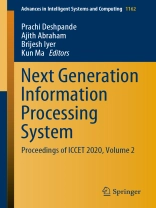This book gathers high-quality research papers presented at the International Conference on Computing in Engineering and Technology (ICCET 2020) [formerly ICCASP], a flagship event in the area of engineering and emerging next-generation technologies jointly organized by the Dr. Babasaheb Ambedkar Technological University and MGM’s College of Engineering in Nanded, India, on 9-11 January 2020. Focusing on next-generation information processing systems, this second volume of the proceedings includes papers on cloud computing and information systems, artificial intelligence and the Internet of Things, hardware design and communication, and front-end design.
Tabella dei contenuti
UAV Communication in FANETs using Metaheuristic Techniques.- On-demand joint predictive Flooding in Vehicular Adhoc Networks.- Entity-Centric Combined Trust (ECT) algorithm to detect packet dropping attack in vehicular ad-hoc networks (VANETs).- Optimized Low Energy Adaptive Clustering Hierarchy in Wireless Sensor Network.- Qo S in Vertical Handoff for Wireless network using Hungarian model and Data Parceling technique.
Circa l’autore
Dr. Mrs. Prachi Deshpande earned her Ph.D. degree in Computer Engineering from Indian Institute of Technology, Roorkee, India in 2016. She is working as an Associate Professor in the University Department of Computer Engineering at Dr. Babasaheb Ambedkar Technological University, Lonere (A State Technological University). She is a recipient of MHRD fellowship during her doctoral degree. She has authored and coauthored over 30 research publications in peer-reviewed reputed journals and conference proceedings, special issue journals on the topics like Io T, big data, and next-generation technologies. She is having an experience of 14+ years in the academics at various positions and had authored 02 books in the area of cloud computing and big data. She has worked as the program committee member of various international conferences and reviewer for various international journals. Her research interests include cloud computing, big data analytics, Io T, data science and cognitive science.
Dr. Abraham works as the Director of Machine Intelligence Research Labs (MIR Labs), a Not-for-Profit Scientific Network for Innovation and Research Excellence connecting Industry and Academia. As an Investigator/Co-Investigator, he has won research grants worth over 100+ Million US$ from Australia, USA, EU, Italy, Czech Republic, France, Malaysia, and China. Dr. Abraham works in a multi-disciplinary environment involving machine intelligence, cyber-physical systems, Internet of things, network security, sensor networks, Web intelligence, Web services, and data mining and applies them to various real-world problems. In these areas, he has authored/coauthored more than 1, 300+ research publications out of which there are 100+ books covering various aspects of Computer Science. About 1000+ publications are indexed by Scopus, and over 800 are indexed by Thomson ISI Web of Science. Some of the articles are available in the Science Direct Top 25 hottest articles. He has 700+ co-authors originating from 40+ countries. Dr. Abraham has more than 32, 000+ academic citations (h-index of 83+ as per Google Scholar. He has given more than 100 plenary lectures and conference tutorials (in 20+ countries). For his research, he has won seven best paper awards at prestigious international conferences held in Belgium, Canada, Bahrain, Czech Republic, China, and India. Dr. Abraham received Ph.D. degree in Computer Science from Monash University, Melbourne, Australia (2001), and a Master of Science Degree from Nanyang Technological University, Singapore (1998).
Dr. Brijesh Iyer received his Ph.D. degree in Electronics and Telecommunication Engineering from Indian Institute of Technology, Roorkee, India in 2015. He is an Associate Professor in the University Department of E&TC Engineering at Dr. Babasaheb Ambedkar Technological University, Lonere (A State Technological University). He is a recipient of INAE research fellowship in the field of Engineering. He had 02 patent to his credit and authored over 40 research publications in peer-reviewed reputed journals and conference proceedings. He had authored 05 five books on curricula as well as cutting-edge technologies like sensor technology. He has served as the program committee member of various international conferences and reviewer for various international journals. His research interests include RF front-end design for 5G and beyond, Io T, biomedical image/signal processing.
Dr. Kun Ma received his Ph.D. degree in Computer Software and Theory from Shandong University, Jinan, Shandong, China, in 2011. He is an Associate Professor (University Professor) in Shandong Provincial Key Laboratory for Network-based Intelligent Computing and School of Information Science and Engineering, University of Jinan, China. He has authored and coauthored over 60 research publications in peer-reviewed reputed journals and conference proceedings. His entire publications have been cited over 330 times (Google Scholar). He has served as the program committee member of various international conferences and reviewer for various international journals. He is the Co-Editor-in-Chief of International Journal of Computer Information Systems and Industrial Management Applications (IJCISIM) and International Journal of Autonomic Computing (IJAC). He is the managing editor of Journal of Information Assurance and Security (JIAS). He is the editorial board member of International Journal of Grid and Utility Computing and International Journal of Intelligent Systems Design and Computing. He is the guest editor of International Journal of Grid and Utility Computing, Informatica, International Journal of Communication Networks and Distributed Systems, International Journal of High Performance Computing and Networking, Recent Patents on Computer Science, and International Journal of Services Technology and Management. His research interests include model-driven engineering (MDE), data-intensive computing, and big data management. He has obtained 7 patents for inventions.












